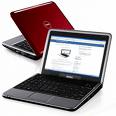Netbook Buying Guide

Specifications |
| Manufacturer |
Samsung |
| Processor |
Intel Atom |
| CPU speed |
1600 Mhz |
| Graphics |
Intel GMA 950 |
| OS |
Windows XP Home, Linux (Ubuntu) |
Display Size
|
8.9" @ 1024 X 600 |
| Memory |
512 MB |
| Hard Drive Storage (Flash) |
4,8,16 GB SSD |
| Battery |
32 (W/hr) (4 Cell) |
| Weight (Ounces) |
37.7 oz. (2.3 lbs) |
| Dimensions |
9.1 X 6.9 X 1.2 |
Expansion and I/O: |
| Ethernet 10/100 |
| Line-out / Headphone |
| MIC-in |
| Multi Card Reader |
| USB 2.0 (X3) |
| VGA Out |
Connectivity |
| 802.11b/g |
| BT 2.0 (On some models) |
| Optional 3G |
Additional Notes and Accessories |
| 0.3, 1.3MP Webcam |
We all knew that Dell would eventually enter the netbook market with an offering of their own. The Dell Mini 9 then came as no surprise to many keeping eyes on this market. Dell engineered a few interesting design aspects into the Mini 9 such as the elimination of the Function keys to allow for a larger keyboard. Dell also opted for the smaller 8.9" screen's as well as only offering the Mini 9 with SSD drives.
In actual use the Dell Mini 9 feels very plasticy and cheap. It is a good choice for students needing a netbook that has the strong backing of a good company and the option to purchase a laptop with an additional warrenty and still be under $500. Unfortunately the DIY crowd and consumers that like to upgrade will find themselves sorely dissappointed by the Mini max of 1GB memory and no ability to upgrade to standard storage.








